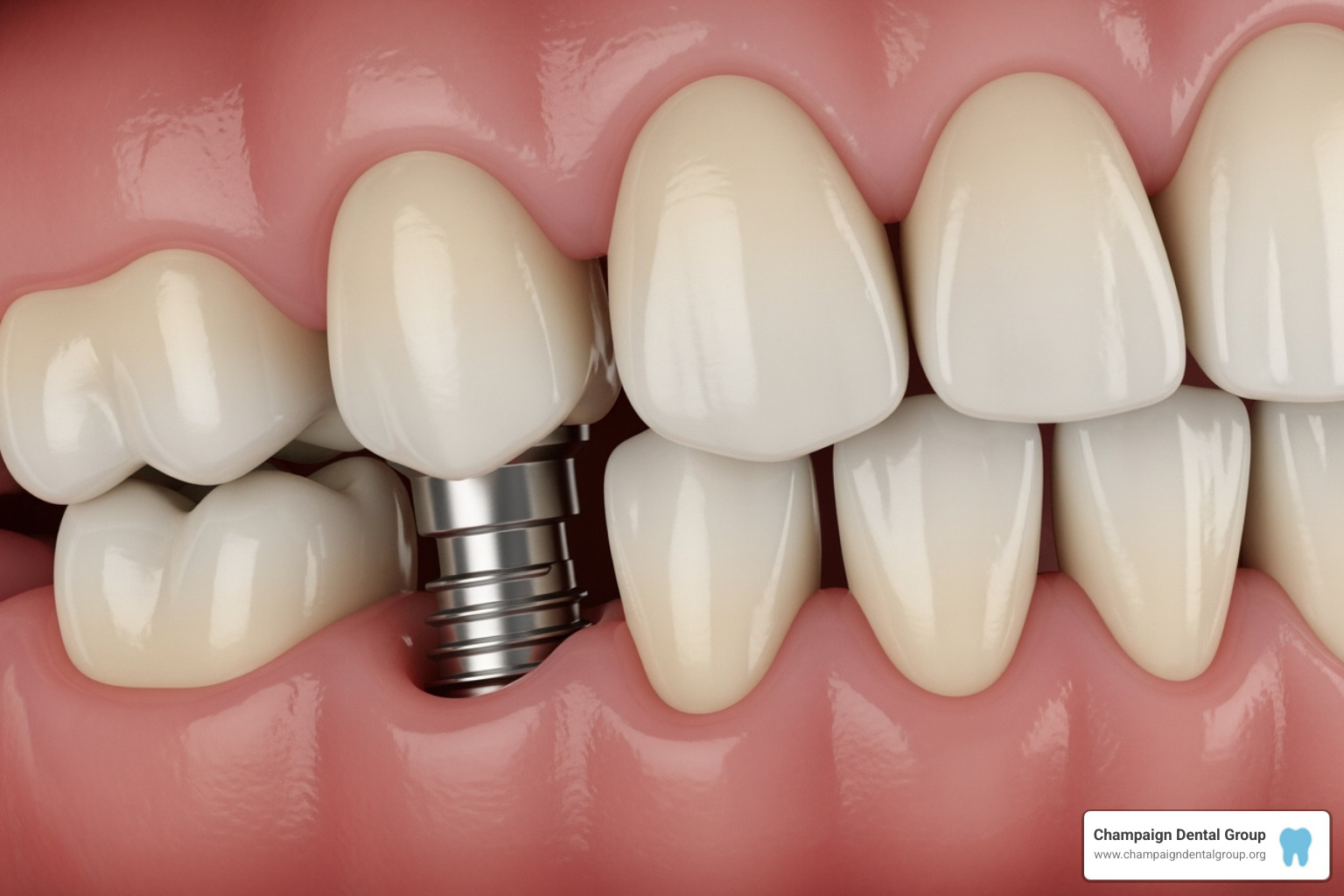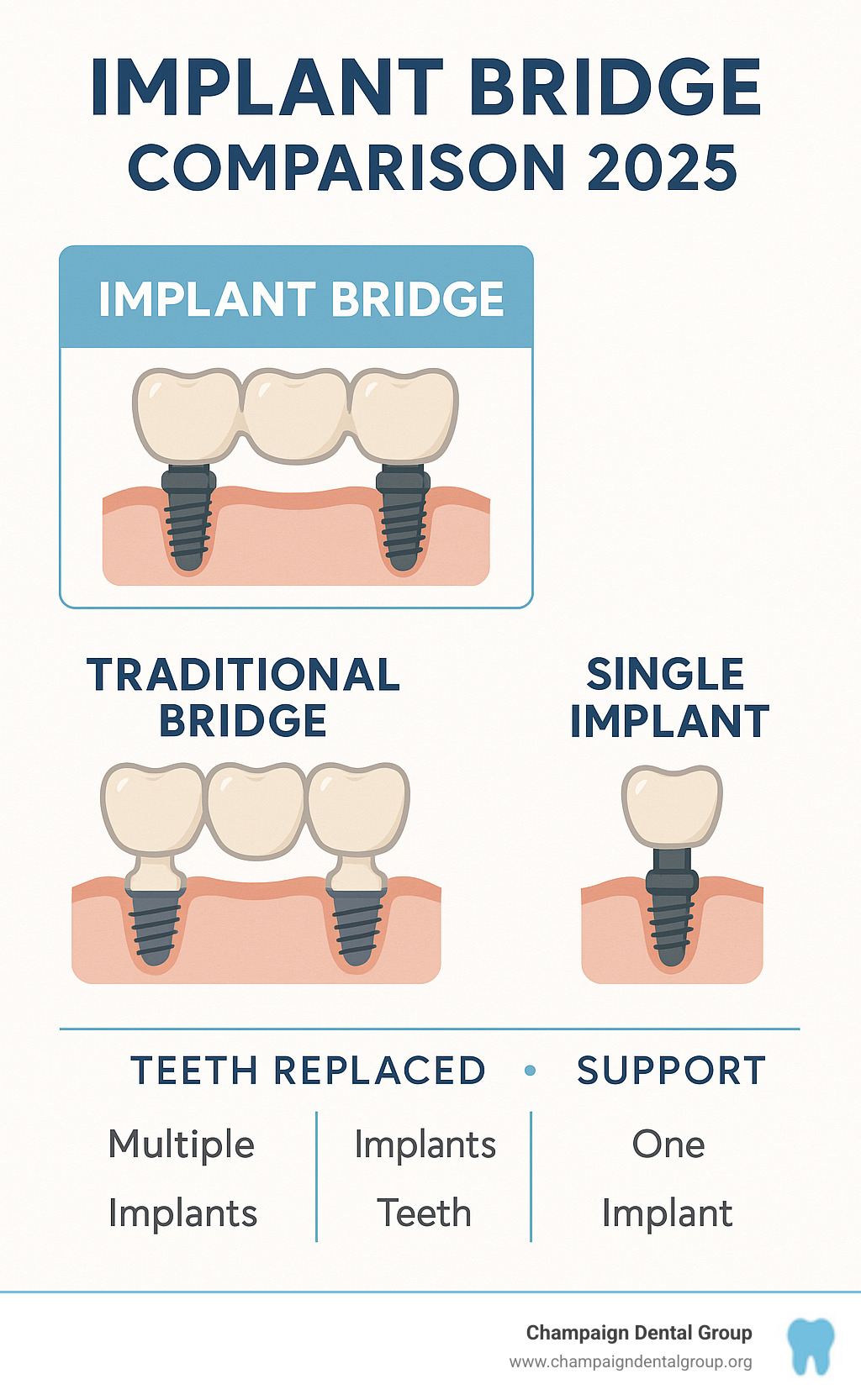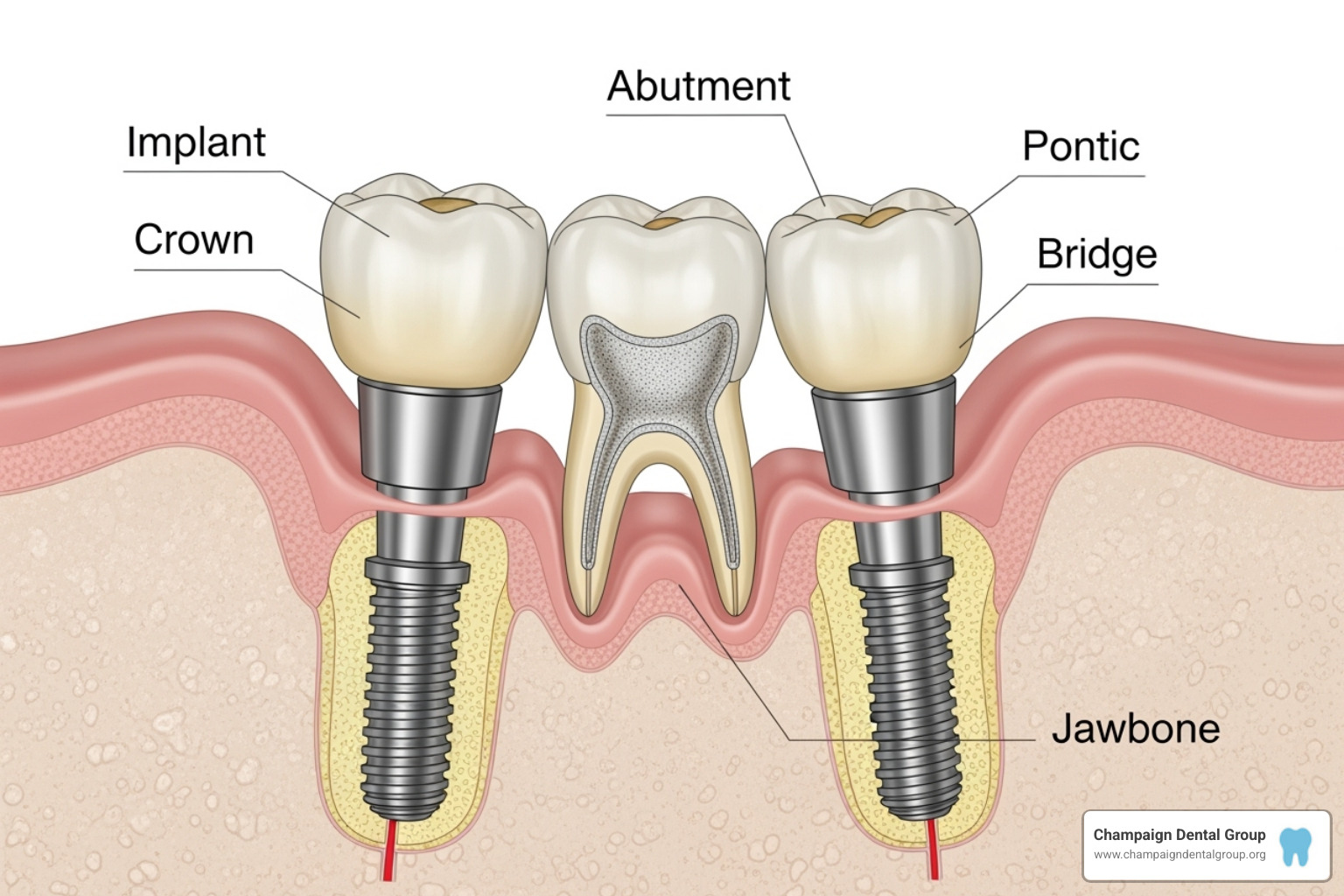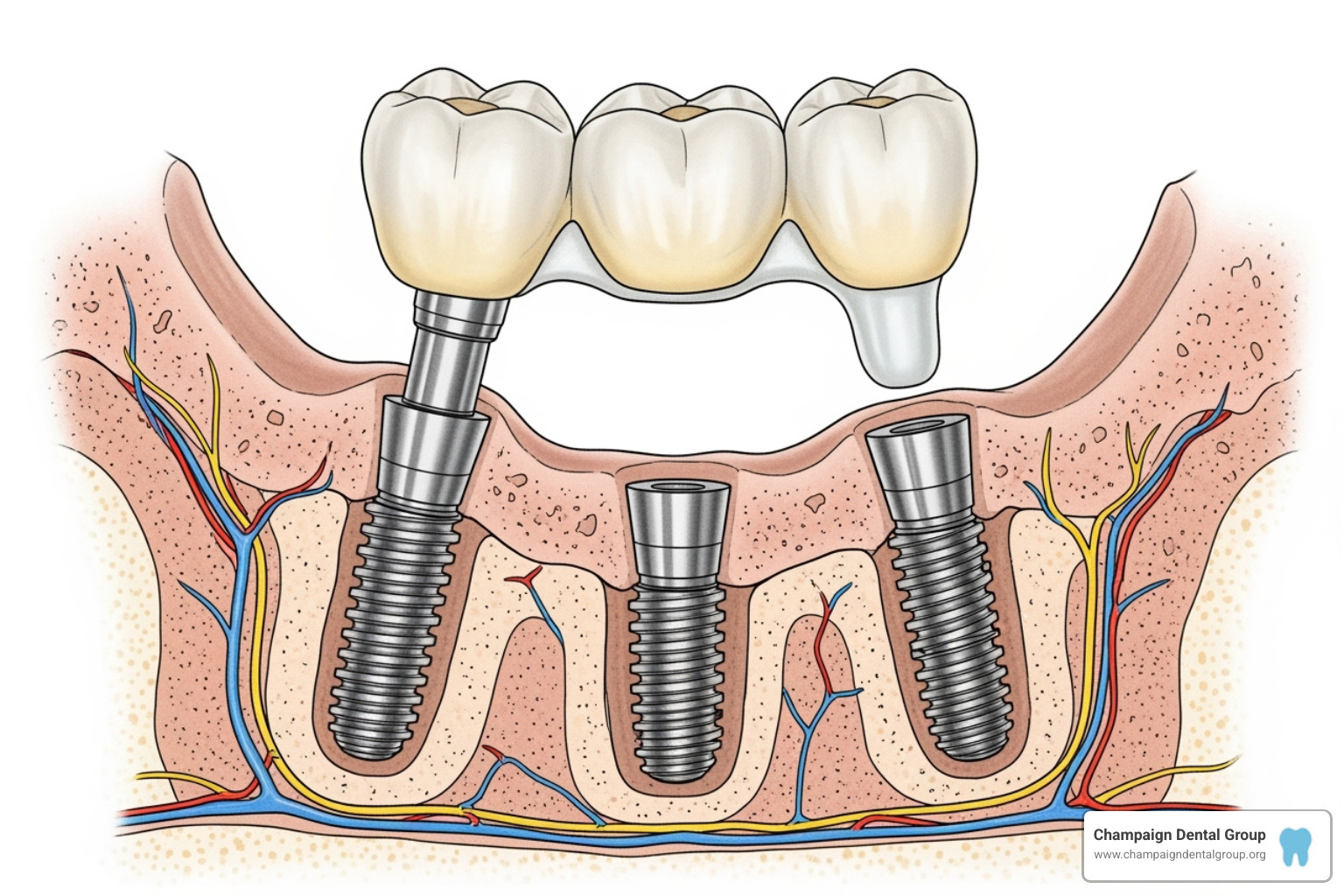Implant Bridges Explained: Smile Confidently Again

Understanding Implant Bridges
An implant bridge is a smart, lasting solution for missing teeth. It helps you eat, speak, and smile with confidence.
Here's the quick answer to what an implant bridge is:
- What it is: A custom-made dental restoration that replaces several missing teeth in a row.
- How it works: It's securely held in place by dental implants. These are small, durable titanium posts placed in your jawbone.
- Why it's great: Unlike old-style bridges, it doesn't harm your healthy teeth. It feels and looks incredibly natural.
Tooth loss is really common. About 69 percent of adults aged 35 to 44 have lost at least one permanent tooth. By age 74, about a quarter of Americans have lost all their adult teeth.
Missing teeth can make life tough. It affects how you eat, how you speak, and even how you feel about your smile. Many people turn to dental restorations to fix these issues.
While there are many ways to replace missing teeth, an implant bridge offers a unique blend of stability and natural feel. It's a top choice in restorative dentistry today. This guide will walk you through everything you need to know.

Explore more about implant bridge:
What Is an Implant Bridge and How Does It Compare to Other Options?

When several teeth in a row are missing, an implant bridge lets us replace them all with one stable, fixed restoration. Two (occasionally three) small titanium implants are placed in the jaw and, after healing, act like new tooth roots. A custom bridge containing the replacement teeth is then fastened to special connector pieces called abutments.
Main parts at a glance:
- Dental implants – tiny titanium posts anchored in bone
- Osseointegration – 3–6 months of healing while bone fuses to the posts
- Abutments – connectors that rise above the gums
- Pontics – the visible replacement teeth that form the bridge
Together they create a restoration you never remove, chew on normally, and clean just like natural teeth.
How an Implant Bridge Differs from a Traditional Bridge
| Feature | Implant Bridge | Traditional Bridge |
|---|---|---|
| Support | Implants in the jaw | Crowns on neighboring teeth |
| Adjacent teeth | No grinding | Requires grinding healthy teeth |
| Jawbone health | Keeps bone stimulated | Bone can resorb |
| Typical lifespan | 15–25 + years | 5–15 years |
| Daily care | Brush & floss normally | Special floss threaders needed |
In short: an implant bridge is kinder to nearby teeth, protects bone, and usually out-lasts a conventional bridge.
Implant Bridge vs. Single Implants or Partial Dentures
- Single implants are ideal for a single missing tooth. If three-plus teeth are gone in a row, using one implant for every gap is costlier and involves more surgery.
- Implant bridge is the sweet spot for three to five adjacent teeth: two implants can hold a 3- or 4-tooth span very economically.
- Removable partial dentures cost less up-front, but can click, shift, and stress remaining teeth. A fixed implant bridge feels natural, is up to 70 % stronger, and needs no nightly removal.
Want a deeper dive? See Dental Implant Options: Your Guide for Replacing Missing Teeth.
The Main Benefits and Potential Drawbacks of an Implant Bridge

Key Advantages
- Preserves jawbone – implants keep the bone active and prevent the sunken appearance that follows tooth loss.
- Protects healthy teeth – no crowns or extra stress on neighboring teeth.
- Longevity – studies show implant success rates around 97 % after 10 years; many last for decades.
- Natural feel – chew, speak, and smile with confidence; no slipping or clicking.
- Easy care – brush and floss (or water-floss) just like you do now.
Considerations
- Higher initial cost than a traditional bridge or partial denture, though usually cheaper over a lifetime thanks to fewer replacements.
- Time investment – 4–8 months to allow bone to fuse to the implants.
- Minor surgery – performed comfortably with local anaesthetic and, if desired, gentle sedation.
- Health requirements – good general health, adequate bone, and healthy gums are needed; bone grafting can often create the foundation when bone is thin.
Read more about the science in “Benefits of Dental Implants” and the implant process.
The Procedure: From Consultation to Your New Smile

Getting an implant bridge at Champaign Dental Group involves three clear steps, and our caring team is with you throughout.
1. Consultation & Planning
- Comprehensive exam and digital 3-D (CBCT) scan
- Check bone volume, gum health, and overall health
- Discuss goals, options, and costs up-front — including Champaign Dental’s Smile Protection Plan and financing choices
2. Implant Placement
- Implants placed precisely with local anaesthetic (sedation available)
- Most people say it’s easier than expected
- 3–6 months of quiet healing while bone bonds to the posts; a temporary bridge keeps your smile intact
3. Final Bridge Placement
- Small abutments are attached
- Precise impressions sent to our top-tier lab; porcelain or zirconia bridge crafted to match your bite and smile
- Bridge is secured, bite fine-tuned, and you head home with a strong, natural-looking smile in place
Regular six-month check-ups and meticulous home care will help your new bridge last 15–25 years or beyond.
Candidacy, Cost, and Long-Term Care
At Champaign Dental Group, we believe that everyone deserves a healthy, confident smile. That's why we're dedicated to providing compassionate care and a personalized approach for every patient. We’ll carefully assess your unique situation, openly discuss all financial considerations, and guide you on how to care for your new implant bridge for a lifetime of happy, healthy smiles.
Who Is a Good Candidate for an Implant Bridge?
While implant bridges are a truly wonderful solution for missing teeth, it’s important to know if they're the right fit for you. During your consultation, we'll carefully evaluate your specific situation. Generally, the best candidates are those who have:
- Good overall health: Your general health plays a big part in how well you heal. If you have certain chronic conditions, like uncontrolled diabetes, we'll need to discuss how they might affect the process. We'll always go over your full medical history with you.
- Sufficient jawbone volume: This is super important! Your implants need a strong, solid foundation to fuse with. If you've lost some bone in your jaw, don't worry. We can often recommend preparatory procedures, like bone grafting or a sinus lift, to build up the necessary bone before we place the implants.
- Healthy gums: We want your implant bridge to last, and that starts with healthy gums. If you have any active gum disease or significant tooth decay, we'll need to address those issues first to ensure a healthy foundation for your implants.
- Non-smokers preferred: Smoking can really slow down healing and increase the risk of an implant not taking properly. While it's not always a complete deal-breaker, we strongly encourage patients to quit or reduce smoking for the very best results.
- Commitment to oral hygiene: Your part in keeping your implant bridge healthy is vital! Being committed to excellent daily brushing and flossing habits is key to its long-term success.
Even if you don't tick every single box right away, our experienced team at Champaign Dental Group is here to help. We can often work with you to prepare your mouth, making successful implant placement possible. We're here to guide you every step of the way!
Understanding the Cost and Insurance Coverage
We understand that investing in an implant bridge is a significant decision, and the cost can vary. Several factors play a role, such as the number of implants needed, the materials used for your custom bridge, and the overall complexity of your case. We promise to be completely transparent about all costs involved during your consultation.
When it comes to insurance, coverage for dental implants and implant bridges can be a bit tricky. While some basic dental insurance plans might not cover these procedures (sometimes viewing them as cosmetic), many do offer some coverage. We'll work closely with you to understand your specific insurance benefits and help you maximize any coverage you have.
We're committed to making quality dental care accessible to our community. That’s why we offer affordable options, including Champaign Dental Group's Smile Protection Plan. We also partner with helpful third-party financing solutions like CareCredit, which can help you manage the cost with convenient payment plans. Our friendly team will openly discuss all financial aspects with you, so you can find a solution that fits your budget and helps you achieve your dream smile.
How to Care for Your Implant Bridge for a Lasting Smile
Once your beautiful new implant bridge is in place, caring for it is surprisingly simple and absolutely crucial for its long life! With just a little daily effort and regular check-ups, your implant bridge can truly last 15 to 25 years or even a lifetime.
- Daily Oral Hygiene: Think of your implant bridge just like your natural teeth – they love to be clean! Brush at least twice a day with a soft-bristled toothbrush and fluoride toothpaste.
- Brushing and Flossing Techniques: Pay special attention to cleaning around your implants and under the bridge. While regular flossing works for the front and back, using a water flosser or a floss threader can be a game-changer. These tools help you clean effectively in those tricky, hard-to-reach areas around and under the artificial teeth (pontics), ensuring no plaque or food particles are left behind.
- Regular Dental Check-ups and Professional Cleanings: These visits are non-negotiable for the long-term success of your implant bridge! We recommend seeing us for regular dental check-ups and professional cleanings every six months. During these visits, our amazing team can assess the health of your implants, gums, and any remaining natural teeth. We'll also give your bridge a thorough professional cleaning, removing any plaque and tartar buildup that even the best home care might miss. This proactive approach helps prevent complications and ensures your implant bridge serves you well for decades.
- Avoiding Hard or Sticky Foods: While your implant bridge is incredibly strong and stable, it’s always wise to be gentle. Try to avoid excessively hard candies, chewing on ice, or super sticky foods that could potentially put undue stress on your restoration.
With this diligent care, your implant bridge will continue to provide you with a beautiful, functional smile that you'll be proud to share for years and years to come!
Frequently Asked Questions about Implant Bridges
We love answering questions about implant bridges! Over the years, we've noticed that many of our patients have similar concerns and curiosities. Here are the most common questions we hear, along with our honest, straightforward answers.
How many teeth can an implant bridge replace?
This is one of our most popular questions, and the answer might surprise you! An implant bridge can effectively replace anywhere from three to five missing teeth in a row, and sometimes even more depending on your unique situation.
Here's how it works: typically, just two strategically placed dental implants can support a bridge of three or four artificial teeth. It's pretty amazing when you think about it – those two implants act like strong pillars, holding up the entire bridge with excellent stability and chewing power.
The exact number depends on factors like your jawbone density, the location in your mouth, and your individual needs. During your consultation at Champaign Dental Group, we'll assess your specific case and let you know exactly what's possible for your smile.
Is the implant bridge procedure painful?
We completely understand why this question comes up so often – nobody wants to be in pain! The good news is that most of our patients are pleasantly surprised by how comfortable the process actually is.
During the surgical placement of your dental implants, you'll receive local anesthesia, which means you won't feel any pain during the procedure itself. Many patients tell us it feels similar to getting a filling or having a tooth extracted. For those who feel anxious about dental procedures, we also offer sedation options to help you relax completely.
After the surgery, you might experience some mild discomfort, but it's typically very manageable with over-the-counter pain relievers like ibuprofen or acetaminophen. Most patients find that any discomfort subsides within just a few days.
Our compassionate team at Champaign Dental Group will provide you with detailed aftercare instructions and will be available to answer any questions during your recovery. We're committed to making sure you feel comfortable every step of the way.
Can an old traditional bridge be replaced with an implant bridge?
Absolutely, yes! This is actually a very common procedure, and often one we highly recommend. If your old traditional bridge is failing, causing problems with the supporting teeth, or if you're experiencing bone loss underneath it, replacing it with an implant bridge can be a game-changer for your oral health.
Think about it this way: your old traditional bridge relied on your natural teeth for support, which often meant those healthy teeth had to be ground down. Over time, this can lead to complications with those supporting teeth. An implant bridge, on the other hand, stands independently and doesn't put any stress on your remaining natural teeth.
Even better, the dental implants will actually stimulate your jawbone, helping to prevent further bone loss and maintain your facial structure. Many of our patients who make this transition tell us it's like getting an upgrade – better comfort, improved function, and a more natural-looking smile.
At Champaign Dental Group, we've been helping patients make this transition since 1997, and we're always amazed at how much it can improve someone's quality of life. If you're dealing with an old bridge that's giving you trouble, we'd love to discuss whether an implant bridge might be the right solution for you.
Restore Your Smile with Confidence at Champaign Dental Group
Imagine refinding the joy of a full, vibrant smile – one that lets you eat your favorite foods, speak clearly, and laugh without a second thought. That's the incredible gift an implant bridge can offer.
It's more than just filling a gap; it's a truly life-changing solution for missing teeth. An implant bridge brings unparalleled stability, a look so natural it blends seamlessly with your own teeth, and wonderful long-term benefits for your overall oral health. Think of it as a permanent, reliable answer to tooth loss.
While any significant dental restoration is an investment, the long-term value of an implant bridge is simply immense. Because of its incredible durability and the way it supports your jawbone, it often proves to be the most sensible and cost-effective choice over your lifetime. It can save you from future complications and expenses that might arise from less permanent options.
Choosing the right team to guide you on this journey is just as important as the implant bridge itself. At Champaign Dental Group, we truly believe in comprehensive family dental care, built on a foundation of genuine compassion and cutting-edge technology. We’ve been a proud part of the Champaign community since 1997, and our heart is in helping you achieve your healthiest, happiest smile.
Our unique approach blends advanced dental techniques with a genuinely warm, patient-centered philosophy. From the moment you walk through our doors, your comfort and satisfaction are our top priorities. Our experienced team will work closely with you, crafting a personalized treatment plan that uses the very latest advancements to ensure the best possible outcome for your smile.
Ready to take the next exciting step towards a complete, healthy smile? Let us help you refind the confidence that comes with eating, speaking, and smiling without a hint of hesitation. We can't wait to welcome you!
.jpg)